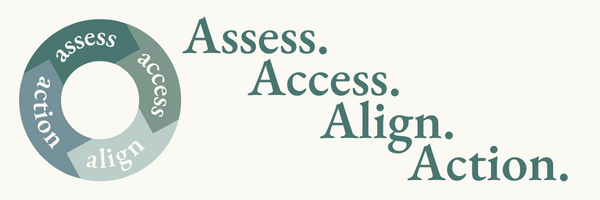Access Your Truest Wisdom
Our modern educational and work systems move in ways that create a whiplash of chaos, crisis, and tension. We are offered very small moments of relief - weekends, a holiday - that barely do anything to shift the body’s nervous system out of flight, fright, and freeze.
It is by systemic design that we find ourselves as adults burnt out, physically and existentially exhausted, and wholly disconnected from our body and soul.
There was a time when I didn’t even know I was disconnected from my own body. I didn’t know the extent of that separation until I started to access that connection to Mother Nature, my own soul work, and my embodied experience.
My typical response when asked what I wanted was, “I don’t know.”
This applied to smaller decisions like a restaurant selection for the night or room decoration. I’d default to other people’s preferences or make a decision by just not deciding.
I wouldn’t trust my ‘gut’ or intuition, so I’d heavily over analyze and over research decisions. I stayed in toxic relationships. At work, I would make decisions ‘by the book’ instead of considering the current context and complexity. I made decisions based on other people's paradigms, not my own leadership values or my own life philosophy. And sometimes it was death by indecision that looked like avoidance, inaction, or, worse, incompetence.
Not knowing myself in small ways made it impossible to move forward with the bigger parts of myself and my life.
But how do you even start to know yourself in this deeper, wiser way? Where do you start when you might not even realize the extent of disconnection?
First: you Assess – which we covered last week.
Next up is Access.
We access our greatest and truest wisdom through our body where our authentic voice originates. In my coaching and consulting work, I bring in, to varying degrees, practices of embodiment, creativity, and Nature connection.
Each of us knows exactly what we need, but maybe you’ve forgotten how to access that. By relearning how to connect through our bodies, we can stay connected to nature and spirit as guides and start to tune out the noise of other people’s opinions and choices.
As a former talking academic head who was disconnected from her body, I can say that this sounds easy and yet can feel challenging when we don’t grow up in a society or systems that role models how to be embodied. These deeper assess and access embodied skills can be hard for those of us who spend most of our time in our thinking brain. Rather we grow up learning over and over how to keep dissociating.
Here’s a place to start.
Step One: Felt sensations words.
Let’s start where many adults are more comfortable: naming. As you begin to assess your readiness for change, you notice more and this is where naming comes in handy. A version of this somatic word list was taught to me when I did my somatic trauma training with the Somatic Wilderness Therapy Institute.
First, explore this list of words. Generally, we have such a limited vocabulary for emotions and felt sensations.
Which words are you drawn to more?
Which words do you feel a push back or resistance to?
Are there words you’d like to add to your own somatic list?
Step Two: Access your own felt sensations.
As you begin or continue your own body awareness practice, you can use these questions to help assess and access:
As you scan your body, what felt sensations are you aware of?
As you think about [current issues/situation/person/thing], what felt sensations are you noticing inside your body right now?
Is there a story you have attached to that felt sensation? A story is the thought you apply to a feeling.
Follow up step: Keep exploring.
If you’re newer to embodiment or not sure how else to think about it, check out these other reads:
What words did you more drawn to? What was surprising about bringing awareness to the felt sensations in your body? I'd love to know!
